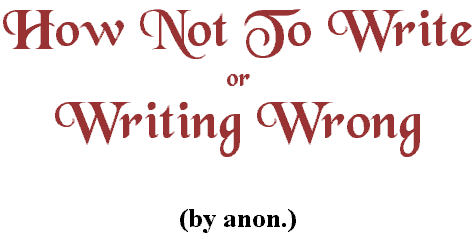|
My art, like cubism, is an attempt at breaking through an appearance
of who I am to get to the essence beneath by deconstructing certain
phenomena and themes in my life and presenting the resultants side
by side in a collection of similar views taken at slightly different angles.
You can look at each view independently, as you can look at each
individual "take" in a cubist painting, and you might try to do just that
in order to try to make some sense of it, but you will only begin to
comprehend its real truth when you see it all as one. Any individual
piece of it is incomplete. But the world doesn't want an incomplete art
of self. Audiences want art to create the illusion of the world as
a definite place to be, a place that makes sense. The world wants an art that confirms
an absolute, even if it is not the absolute that any individual perceiver wants
to believe in. My art is not absolute, it is tentative, it says, "Tomorrow,
or an hour from now, conditions will be different, the world will not be
the same, and this art will be gone." In circumstances such as these, how can
you expect me to be self-assured, let alone believe that one day I will
produce world-renown art?
There's just not that much difference, if any, between best sellers, moderate sellers, low sellers, and no sellers in terms of writing quality. Often, best sellers are of only average quality, e.g., John Grisham or Tom Clancey.
So quality, above a certain minimum acceptable level (correct grammar, etc., when it is appropriate) has nothing to do with the process of publication. Ostensibly, publication has to do with what the readers want, but often, what the readers want is what they're influenced to want, by the marketeers, and who knows by whom else.
Knowing this is enabling, if not in terms of earning a living as a writer, at least in terms of understanding that you can be a legitimate artist without being published, or shown, or popular.
But even this should not have to be the case (but we can get so down on ourselves, not being reinforced in our efforts). If you pursue your life as an artist whose purpose is expression, then the expression is the meaning. Legitimacy has no relevance.
If you are said to produce "bad" art, what does that mean? It means that a majority of people do not think you are any good. And since when did that become the deciding factor in art? It is a factor, maybe, in style, if you want to travel that road, and I don't, so why bother?
In this sense, maybe it is better that I never become published. I've never wanted to do what others were doing. I've always rebelled. I've always shied away from the crowds. Why do I want, then, now to be accepted. It's ironic. I am better off being unknown. (Sour grapes? Lack of security? Low self-esteem?)
I have an ideal of the pure artist, unpolluted by the hype, who eschews a society of popularizers of technique and content. (This is analogous in some circles to the avoidance of political correctness for its own sake.) The epitomé of this ideal would be an unpublished writer, an unseen artist, and the epitome, in this sense, of individuality would be a hermit living in the hills.
Stories function to keep ideas alive in a society. I overheard someone in a video store say, "I'm sick of stories about the holocaust." I caught myself starting to agree with him, until I realized that the only way in which we will ever prevent the recurrence of that or any other tragic epoch in our history is if we are kept aware of it, if it is etched into our collective memory. Storytelling is the device that does the etching.
My stories, if they can be called that, many of them (I don't call them that, but I guess that's what they are), are not told widely. They do not etch, since etching is done by many stories told by many storytellers over time. (They etch me, but that's a different story.) My art depicts a lesser known holocaust, that of the mind, and how it is twisted by society's pressure. There is an inherent tragedy here to be prevented, but we are not going to prevent it, for a long time to come, because we don't know much of it, it's not too well documented, and that of it we do know, we don't understand too well, and that of it that we do understand, we don't take too much to heart as a society, as a species. We have not yet evolved the empathetic compassion, despite those among us who would want to have it, those who strive, despite themselves, despite their baser natures, to be better than they are. I mean, after all, who takes Kafka seriously any more? Who ever did?
|

